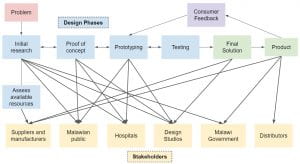Can you believe it has been three weeks already? We’re halfway through our internship! I have learned so much through our morning workshops, team meetings, and reflection, but I just wish there was more time. More time to think, create, and implement our prototypes in the field. More time to talk to our mentors and friends to learn more about who they are and what inspired them to do the work that they do. More time to reflect on how life (resources, culture, environment, etc.) is different between the U.S. and Malawi. There’s always so much more to learn but so little time. In the coming weeks, I hope to continue taking in all the different ideas from the program and reflecting on how these lessons can impact my perspective.
On Monday, our team reflected on who would impact or be impacted by our product and created a stakeholder map. As we went through each step of the engineering design process from the initial research to the final product, we realized that many stakeholders could contribute to a wide assortment of steps and surprisingly interact with each other based on their different priorities. For example, a hospital may be interested in the clinical functions and ease of use of our device, while a manufacturer may only consider how easy it is to mass-produce or if a specific component would be resource-efficient. With all these different inputs and priorities, it’s hard to prioritize which should take precedence in our design, but I’m slowly working through the reasoning with our teammates to be intentional with our final product. What do we want our device to do? Which should be more of a priority: cost or function? Why? And so forth.
 Stakeholder Map
Stakeholder Map
On Tuesday, it was Election Day in Malawi, so our internship took a day off.
On Wednesday, Dr. Wayne Decker talked to us about the Productive Use of Energy like sustainable energy production in rural areas. I wasn’t too familiar with the topic, so it was interesting to hear an expert in the field and feel how passionate he was for his work. I hope to share the same energy for my future career, but for now think about what I do as a living, a hobby, or just for fun.
On Thursday, we had a workshop on Needs Finding, where we learned about different strategies such as observation, interviewing, research, etc. to identify and contextualize an existing need in a scenario. It was an important segway for our coming week when we will interview stakeholders and get their input on our design proposals as well as understand what their prioritized needs are.
On Friday, Dumisani Kaliati talked about his company MicroMek that uses drones to deliver medical supplies to rural communities where access may be limited. It was incredible to hear how he continued to persist through challenges such as initial funding, employee recruitment and training, and finding community partners (village chiefs). Some resistance came because his method (drones) were so unconventional in Malawi, and he was also a very young graduate so there wasn’t much credibility or title established to his name. But even then, he persisted and aligned himself with recognized organizations, applied to grants/business competitions, and ultimately became 2018 YALI Mandela Washington Fellow and Goalkeepers Youth Action Accelerator Advocate. It’s amazing to hear a success story, and I hope to become as resilient as he is.
Signing off,
Austin